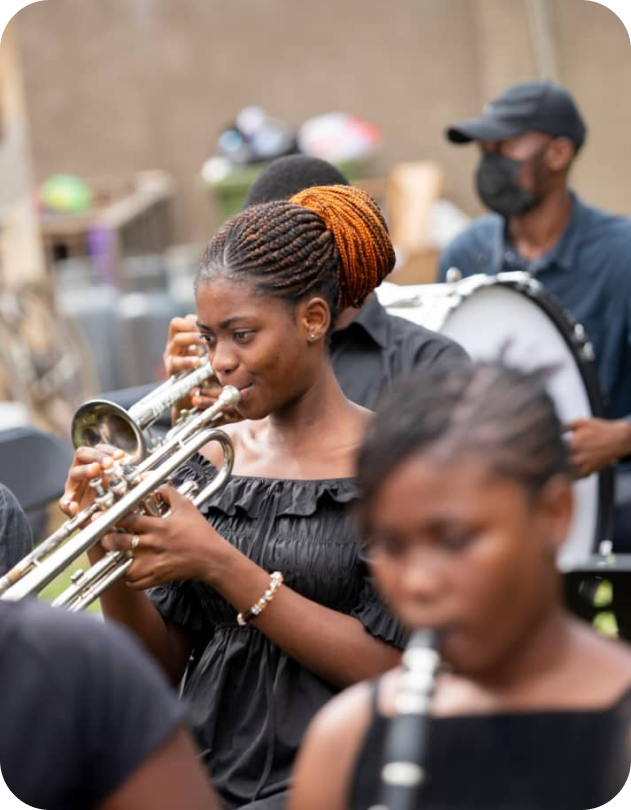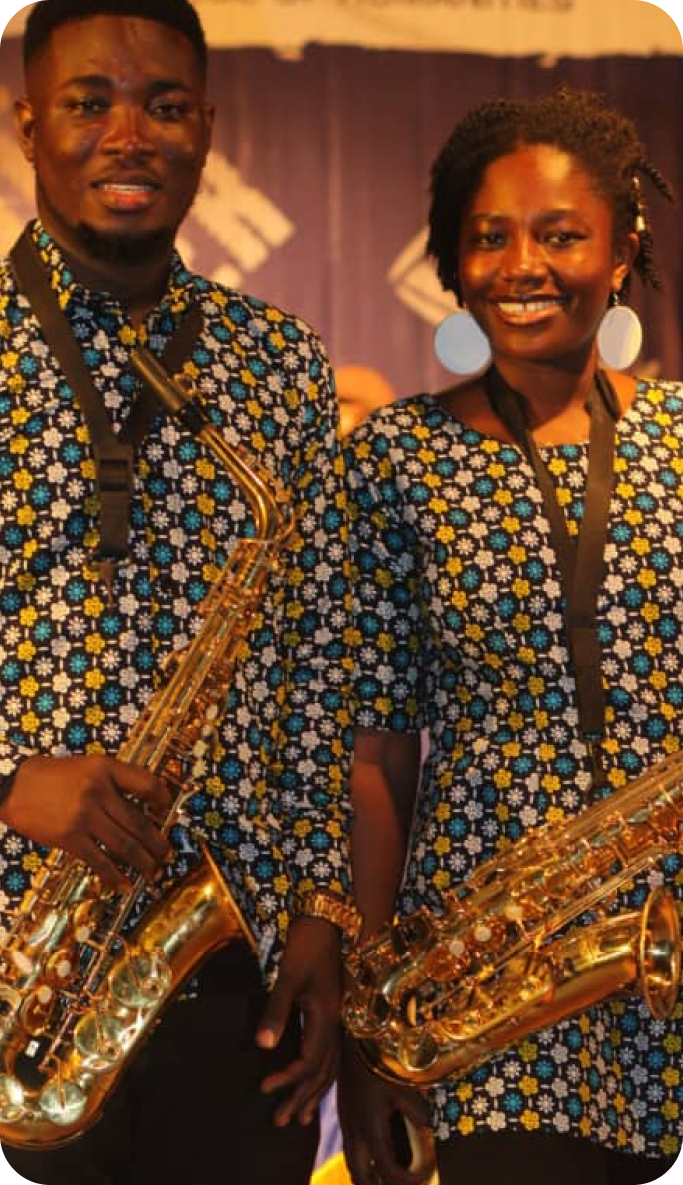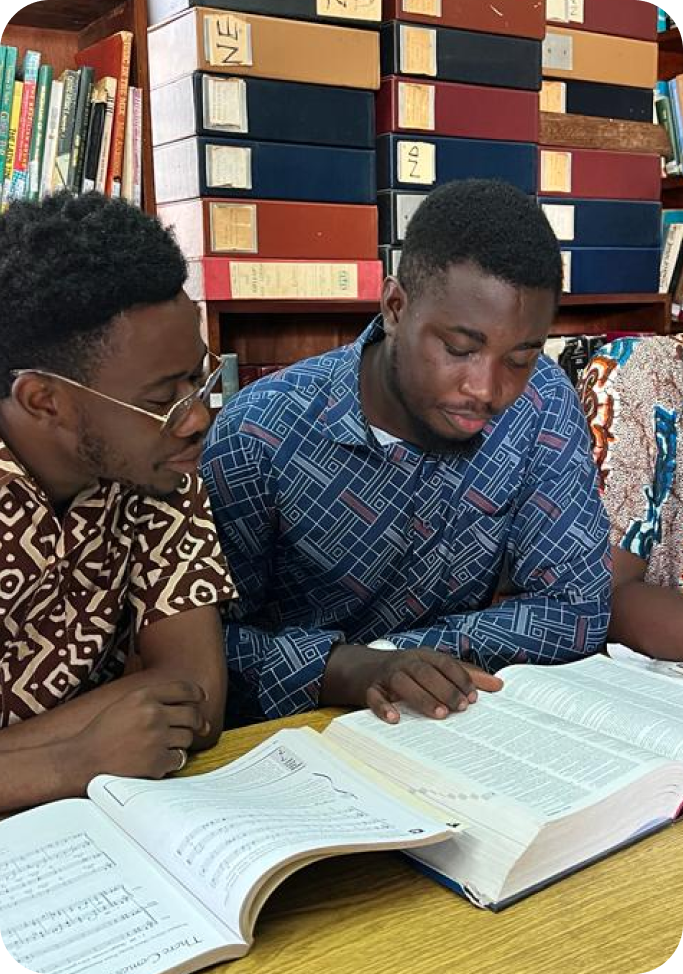Bachelor Degrees (B.A., B.F.A., B.Mus.)
For undergraduate students, the Department has historically offered three-degree options: a Bachelor of Arts in Music (B.A.), a Bachelor of Fine Arts in Music (B.F.A.), and a Bachelor of Music degree (B.Mus.).
The Bachelor of Arts program follows the traditional model of a liberal arts education, allowing students to study music while also taking other courses from the College of Humanities – often majoring or minoring in music alongside another discipline. The Bachelor of Fine Arts program has a more practical component, with the degree awarded to those who undertake broader study specifically within the School of Performing Arts, specializing in at least one of the sister disciplines (drama or dance) in addition to music. The Bachelor of Music degree has historically been awarded to those who specialize solely in music – typically orienting themselves towards a career in performance, composition, scholarship/research, or pedagogy.
In all programs, students typically spend the first two years studying foundational topics in music such as general music theory and terminology, harmony, counterpoint, form and analysis, musicianship, and basic topics in African music and are required to receive practical training on an instrument or voice and participate in an ensemble – with the belief that active participation in the creation of music is integral to development in any music-related field. In the third year, students are allowed to choose electives that reflect their specific interests – ranging from music technology and production to deepening their knowledge of musical traditions of North, East, West, or Southern Africa to a host of others. The undergraduate program culminates in a project-based final year – with students focusing on a project with specific interest to them that is ultimately presented in the form of a composition, performance/recital, or a long essay.


Master of Philosophy in Music (M.Phil.)
The Department of Music offers a two-year Master of Philosophy degree program which goes beyond a traditional Master of Arts degree to require a stronger theoretical as well as practical dimension (with practical instrumental or vocal instruction and ensemble participation mandatory in the first year) in two broad musical disciplines (with encouraged cross-fertilization as students are able to take electives in either):
M.Phil. in Ethnomusicology – Ethnomusicology is the study of music in culture – going beyond a transcription and requisite technical understanding of the music to understanding musical functions and uses, how music relates to the broader cultural landscape, and how it reflects the social and economic, cultural, historical and political milieu in which it is made – delving deeply into the perspective of those who make, participate in, or consume music and leveraging extensive fieldwork as a vital research tool. Our M.Phil. program has equipped and trained some of the most famous scholars in African music globally, although M.Phil students have also specialized in non-African musical traditions, including those of the Caribbean, Middle East, and Asia. The first year of the program is spent in classwork across a range of foundational courses and electives (e.g., Introduction to Ethnomusicology, Contemporary Ethnomusicology, Music of the African Diaspora, the Sociology of Music, Popular Music of Africa, Music, and Gender, Musical Transcription, etc) the second year on fieldwork, analysis and writing of a thesis on a topic of deep interest to the student.
M.Phil. in Music Theory and Composition – In Theory and Composition, students typically spend the first year in foundational courses and electives covering a range of topics pertinent to music theory and composition. Sample courses include Advanced Musical Analysis, Topics in Tonal Theory, West African Art Music Composers, 20th Century Compositional Techniques, Advanced Orchestration, and Organology, with several options for students interested in deepening their knowledge of African traditional music. The second year of the program is focused on thesis work, which may take the form of a specialized topic in music theory or the form of a composition. Sample prior thesis topics include theoretical works such as “Trends and Stylistic Traits in the Art Compositions of E. Amu, N.Z. Nayo, and J.H.K. Nketia (A Theoretical Perspective),” “Generative Processes in African Art Music Composition – the Use of Traditional African Elements,” “The Dagaaba Xylophone Music Tradition: A Study of Methods of Composition,” and creative works/compositions including “Moonlit Night – A Recreational Suite Based on Borborbor, Bawa, and Kpanlogo structures,” “Original Compositions Using Elements From Fumefume Traditional Music,” “Folklore Fantasia,” “Burma Suite,” and “Journal: A Portfolio of Original Compositions”. Our M.Phil. graduates have gone on to become some of the most famous composers, theorists, and ethnomusicologists from Africa, including the likes of Kenn Kafui, George Dor, and Emmanuel Boamah.
Doctor of Philosophy in Music (Ph.D.)
The Department of Music offers full-time Doctor of Philosophy degrees that typically span a three-year timeframe in which students are expected to build on the foundations provided in a Masters-level program (a prerequisite for admission into our Ph.D. program) while making a significant original contribution to knowledge creation or creative output in their specialized concentration area. A solid grounding in advanced research methods, academic writing, and presentations is provided, as well as opportunities to author/co-author papers, present at conferences, and participate in seminars and colloquia with other graduate students. The University of Ghana's Ph.D. program has trained numerous famous music scholars, including Akin Euba and Nisio Fiagbedzi, and numerous visiting international music Ph.D. students or those doing fieldwork in Ghana who have gone on to significant renown, such as James Thomas Koetting (UCLA) have received strong mentorship at the University of Ghana.
The Ph.D. is offered in the following two fields:
Ph.D. in Ethnomusicology – This program builds on offerings in the Ethnomusicology MPhil. Program and goes deeper – requiring students to focus on a single musical tradition or related topic in which they will typically conduct extensive fieldwork, analysis, and writing – becoming, in most cases, the authority within their topic by the completion of their dissertation. In the course of the program, doctoral students have significant interactions with their faculty supervisors and others in the field and are exposed to historical foundations as well as the latest techniques, topics, and trends within ethnomusicology.
Ph.D. in Music Theory and Composition – This program focuses on the study of specialized topics in music theory (including some that focus on African music theory) as well as compositional techniques, styles, and repertoire of the specific musical traditions studied. The emphasis of a student’s doctoral dissertation will vary based upon their orientation towards either a more theoretical or creative interest but, in either case, will require a strong written dissertation (in the case of composition accompanying the composition). Students receive significant mentorship and guidance from their supervisors and other faculty and are given opportunities to share their research in conferences and publications or to have their compositions performed.

